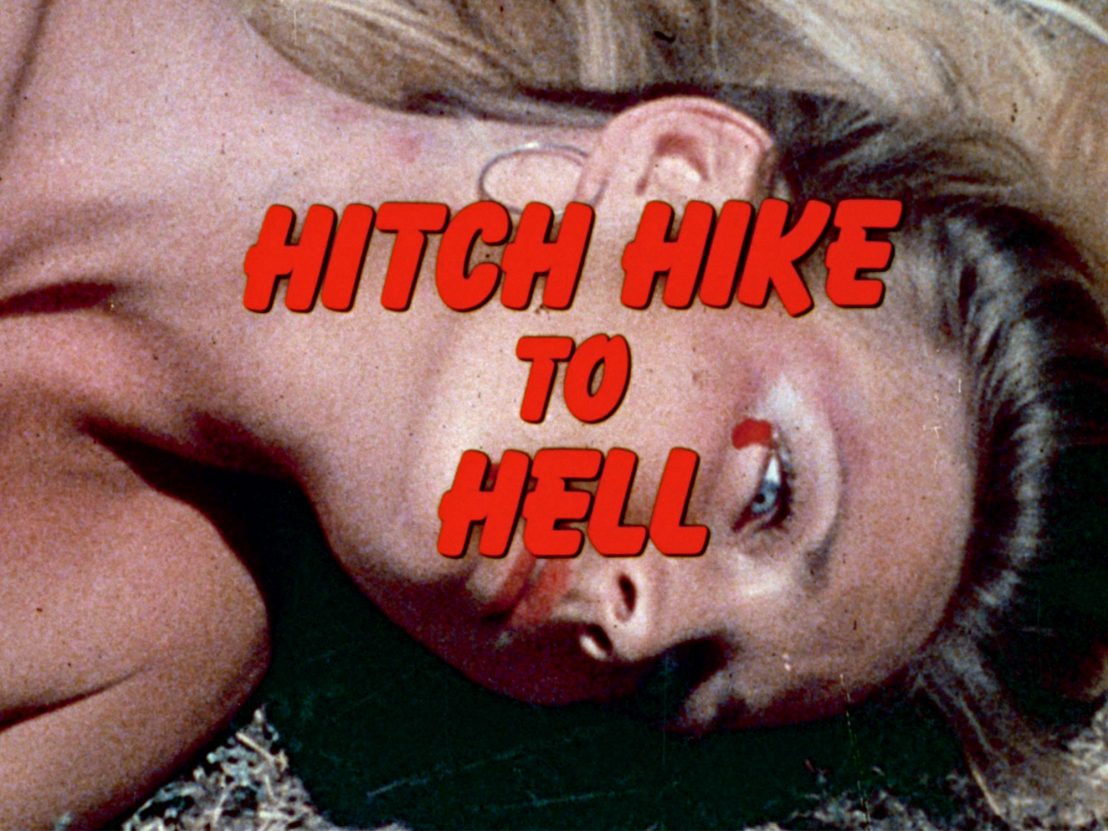
“This is where they dumped me off, after all kinds of lectures and warnings.” So complains Pam (Beth Reis), a teenaged hitchhiker who has just had a run in with Captain JW Shaw (Russell Johnson) and Lt Davis (Randy Echols) of the Crescent City police department. This city in Del Norte County, California is “the hub of highways to everywhere,” and the police are alarmed by a recent spate of rapes and murders perpetrated upon young women travelling through, and so intercepted Pam to give her a lesson in the dangers of hitchhiking.
She should have listened, because the person to whom she is addressing these words is Howard Martin (Robert Gribbin), whose homespun courtesy and aw-shucks naïveté conceal a psychopathic compulsion to kill. The ride that Pam accepts in Howard’s red van will be her last.
Hitch Hike to Hell is itself a peculiar blend of serial kill thrills and “lectures and warnings”. Right from the opening, the sound of a woman saying “No! no!” and screaming (her naked body briefly glimpsed being dumped on the ground) is replaced by the country strains of the titular song whose lyrics (“There’s danger on the road, danger on the road, when you go thumbing a ride”) come with a certain didacticism. The irony here is that the song’s lesson (“Don’t leave your family / The friends who care for you / Think twice, girl, before you go”) offer a principle to which Howard himself is fully subscribed.
Still haunted by the departure of his sister Judy six years earlier, and the betrayal that it represented to his beloved mother (Dorothy Bennett), Harry attacks only runaways – the ones who have left their families and speak ill of their mothers – even calling each of them Judy as he ‘punishes’ their perceived ingratitude and treachery, while he notably leaves untouched the one young girl he picks up who expressly loves her mother (“She’s the greatest girl in the world”) and is just looking for a lift across town rather than leaving home.
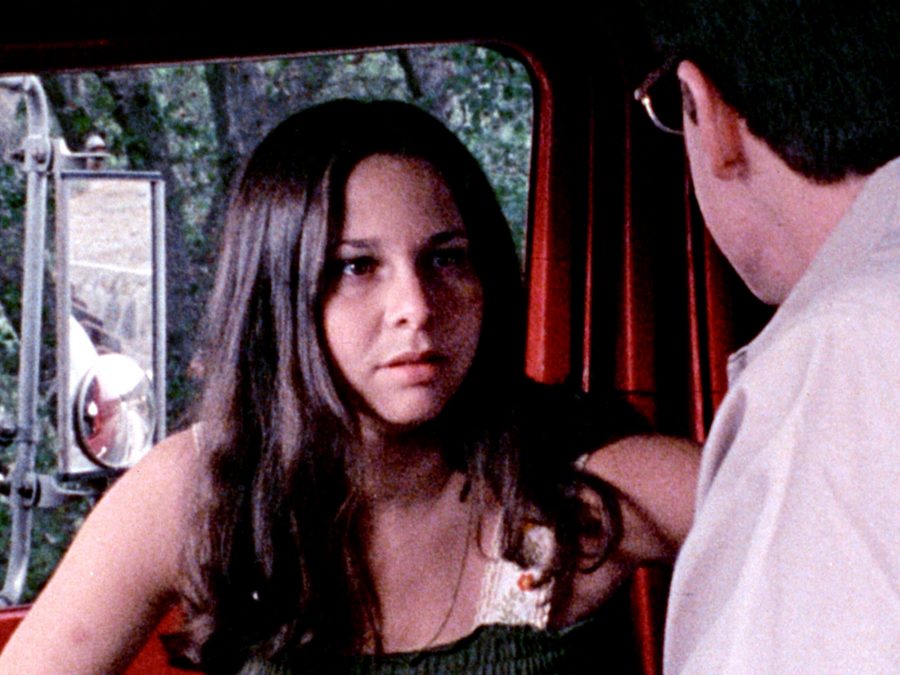
Those around slow, bespectacled Harold – like his mother, or his employer Mr Baldwin (John Harmon) at the cleaning company for which Howard delivers clothes – have noticed that he has been acting strangely these last few weeks, what with his dazed state, his uncharacteristic impunctuality, his blackouts, his loss of appetite and his nightmares. Nobody, however, even suspects that this nice, respectful manchild could hurt a fly.
Even Howard himself has no idea, for he enters a sort of fugue state when he kills, with only the most fragmentary recollection afterwards of what he has done. So as we follow his serial assaults, his split identity enables him all at once to be a nervy Norman Bates figure whose mother-loving fixations (and final manic to-camera scene) naturally conjure Alfred Hitchcock’s Psycho, and to be an Eighties slasher whose only mask is his own amnesia.
We viewers are also left conflicted and split: for we take in the film’s po-faced moralising (“Seems there are delinquent parents as well as delinquent children,” comments Captain Shaw gravely), which gives Hitch Hike to Hell the character of an ABC Afterschool Special; yet at the same time, the film’s exploitation title and stranglings-by-numbers prime us to want to see the next kill, and the next.
The murder scenes themselves are relatively non-graphic, but as Howard’s range of targets broadens from young women to a gay man (Don Lewis) and ultimately to an 11-year-old girl (Sheryl Lynn), our own errant desires as viewers are stretched and tested. For as long as his victims express a desire to get away from their mothers, Howard is perhaps less discriminating than we are, and from that difference, discomfort emerges, as ‘genre-appropriate’ victims are replaced with others.
Director Irvin Berwick’s filmmaking connections went all the way back to the old contract days at Columbia Studios in the Forties (when he worked regularly under B-movie maestro William Castle), and then at Universal-International in much of the ’50s. In 1958 he helped set up independent production company Vanwick Pictures, through which he directed his first picture, The Monster of Piedras Blancas, a cheap Creature from the Black Lagoon rip-off with a monster costume literally pieced together from other films’ discarded monster costumes.
Hitch Hike to Hell was the last film he directed before going on to teach filmmaking at UCLA. If we are being honest, the direction here is unflashy and workaday, even pedestrian, and much of the dialogue in the screenplay from John Buckley (with whom Berwick had previously collaborated on 1979’s Malibu High) comes across as over-earnest and stilted. Nonetheless, like its antihero, it conceals beneath its blandly wholesome exterior some shocking transgressions.
Hitch Hike to Hell is available now on Blu-ray by Arrow Films in a brand new 2K restoration from the original film elements.
Published 25 Nov 2019
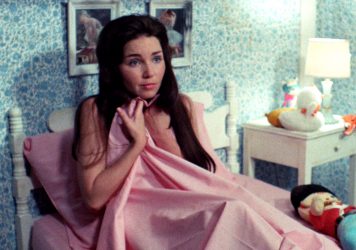
By Anton Bitel
Stanley H Brassloff’s Toys Are Not for Children centres on a doll-like heroine with severe daddy issues.
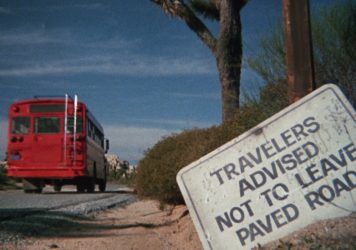
By Anton Bitel
A new Blu-ray of this 1984 cheapjack sequel shows there's more value to it than meets the eye.
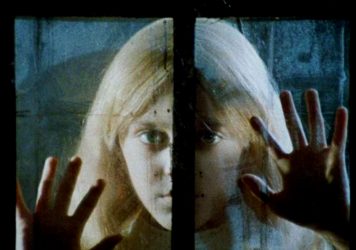
By Anton Bitel
Kill, Baby... Kill! contains one of cinema’s earliest evil children.